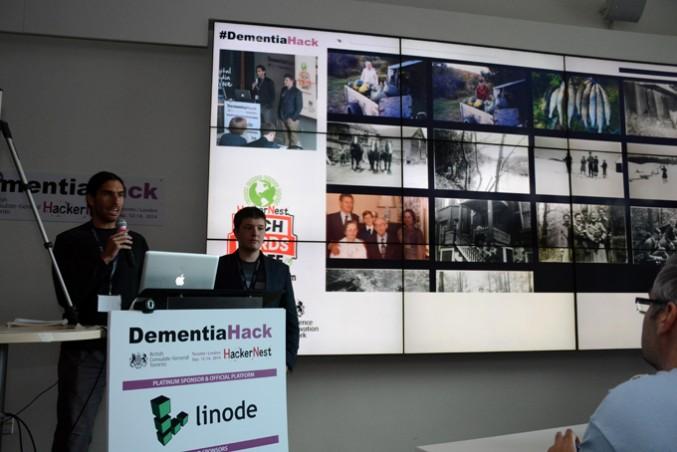By Calvin Dao and Andrea Vacl
Students, computer programmers, healthcare professionals and technology enthusiasts gathered for a weekend-long “hackathon” at Ryerson’s Digital Media Zone Sept. 12-14.
The software building competition — dubbed DementiaHack — was organized by the nonprofit programming organization HackerNest and the British Consulate-General in Toronto. The hackathon brought skilled people with an interest in developing technologies to make the lives of those living with dementia and caregivers easier.
“There are more products to help people with hair loss than dementia,” said Sharris Beh, one of the HackerNest organizers who helped produce DementiaHack.
Brenda Hounam, who suffers from dementia and spoke at the event on Saturday, expressed her need for technology and described how game apps on her iPad “help clear the cloudiness in [her] mind.” The technological entries at the event were judged on ease of use, consumer interest and potential business opportunity.
The grand prize was awarded to the team behind the web Portal CareUmbrella.
Powered by Near Field Communication (NFC) connectivity, it allows patients of dementia and Alzheimer’s disease to call up specific information on their phone by tapping it on an NFC-enabled sticker. This technology comes at the cost of just cents per sticker, according to Hayman Buwan, a physician who came up with the idea three years ago. The web app was produced by Steve McCann, IT developer, and Tammy Le, CareUmbrella designer.
“The reason why NFC was used is because it’s a simple, cheap device that can be used as memory triggers for anything,” Buwan said.
They demonstrated CareUmbrella by tapping their phone onto a sticker coded to bring up an instructional video on how to use a microwave.
One factor that he and his team kept in mind was the importance of letting patients be independent, regardless of their disease’s limitations.
“The worst thing is for these guys to feel helpless,” he said.
As part of their reward, the team will fly to Cardiff, Wales to show their innovation at the December UKHealthTech conference.
This project was personal to Ravi Amin, a CareUmbrella mockup presenter, as his father has dementia. But he was just one of the competitors who’ve been impacted by the disease.
Nitin Malik, an iOS developer who has a family member with dementia, won a runner-up prize with his team for a hardware innovation they called All the Pi.
It uses a single-board computer to play audio reminders to remind patients to complete tasks and sends push notifications to caregivers if a task was not complete at the usual time. For example, when a light switch with this system is turned on, a programmable recording is played reminding them to turn off the light.
“Talking to a lot of people affected by it … gave us a lot of feedback,” said Bien Pham, member of the All the Pi team and a graduate from the mechanical engineering program at Ryerson. “[It] helped us with brainstorming [ideas] to tackle the problem.”
DementiaHack “stimulated connections between Canada and the U.K.” to break into an “untapped market,” said Arlene Astell, one of the judges on the panel and the research chair in the Community Management of Dementia at the Ontario Shores Centre for Mental Health Sciences.
Astell said that the outcome of the event was a surprising success, especially with the way that the competitors “have grasped the issue,” and she hopes that it will be able to take place more often.










Leave a Reply